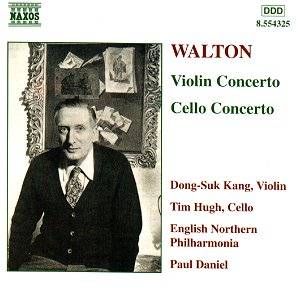
Naxos's Walton series goes from strength to strength proving, once more,
that you do not need star names and orchestras to deliver top-ranking
performances. While I would hesitate to say these performances seriously
threaten the top recommendations of these works, they definitely sit very
comfortably with them.
Paul Daniel is proving himself a powerful and insightful Walton interpreter.
His accompaniments are often revelatory; listen, for instance to the ghostly
woodwinds parading beneath the musings of the soloist towards the end of
the opening Andante tranquillo of the Violin Concerto. One notices so many
small but telling little subtleties like swift, sudden brass colourings in
the scherzo of the Violin Concerto. Unusually in this movement, Daniel's
tempi and mouldings made me aware of a seemingly underlying dramatic narrative
as though I was witnessing some commedia dell' arte production. The scherzos
of both concertos are quite brilliant realisations and have great vitality.
In Daniel's hands, Walton's Cello Concerto's opening Moderato is very poetic
with the strings singing their lovely melody with infinite tenderness. (I
looked at my notes after listening to this album and noticed I had repeated
the phrase 'singing' many times - the lyricism of these works is lovingly
stated). Daniel delivers a poised and controlled, well-integrated performance
of the Cello Concerto and the partnership between cello and orchestra is
particularly close and mutually sustaining.
Both soloists shine. Dong-Suk Kang goes for the risky faster tempi, very
much recalling Heifetz. He confidently succeeds delivering a bravura performance
but his lyrical expressiveness is just as impressive, soaring, sweetly singing
high over the brilliant orchestral chatterings below. Tim Hugh brings much
insight into his interpretation and he probes more deeply, than most, to
the heart of the Concerto. The tempo he favours is a shade relaxed but even
though this allows his introspections, he does not dawdle and he does not
hesitate to dramatically exploit the scores heavier accents. In the central
Allegro appassionato, you feel his hesitancy, his suffering and his reluctance
to be swept away by the orchestra's brilliantly coloured flights of fancy.
'Just one small grouse. The recording is excellent, except for balance -
once more I am complaining (but mildly this time) of a seemingly hole in
the middle effect more noticeable in the Violin Concerto where the strings
seem to be oddly undernourished.
The unusual worthwhile coupling is worth pointing out - so many times the
Violin Concerto is coupled with the Viola Concerto - often played by the
same soloist.
Unhesitatingly recommended.
Reviewer
Ian Lace

